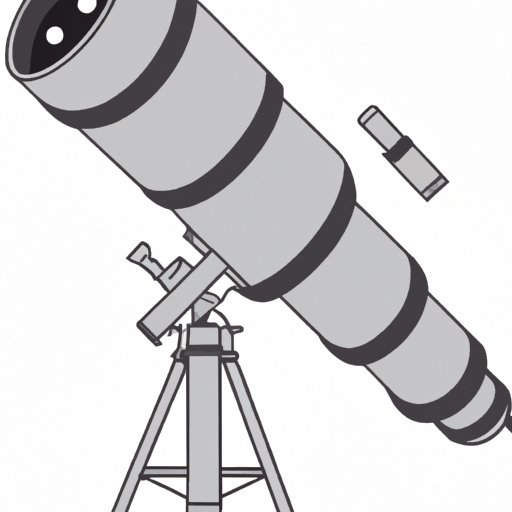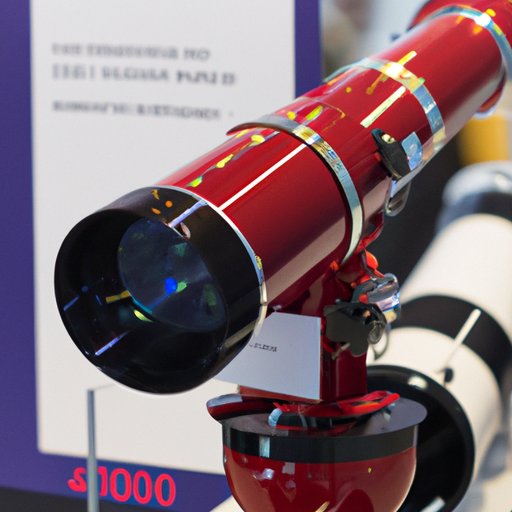Introduction
A telescope is an instrument used to observe distant objects by collecting and focusing light from them. Telescopes come in many shapes and sizes, and they can be used for a variety of purposes, such as astronomy, bird watching, and nature observation. But how much does a telescope cost? That’s what this article will explore.
This article will provide you with a comprehensive guide to the cost of telescopes, including different types of telescopes, factors that affect the cost, recommended budget levels, and tips for getting the best deal when buying a telescope.

A Comprehensive Guide to Telescope Costs
Before we dive into the cost of telescopes, let’s take a look at the different types of telescopes available. There are three main types of telescopes: refractors, reflectors, and catadioptrics. Refractors use lenses to gather and focus light, reflectors use curved mirrors to do the same, and catadioptrics combine both lenses and mirrors to produce an image.
The type of telescope you choose will affect the cost, so it’s important to understand the differences between the three types before you begin your search. In general, refractors are more expensive than reflectors, while catadioptrics are usually the most expensive.
In addition to the type of telescope, there are several other factors that can affect the cost. These include the size of the telescope (which affects the magnification), the quality of the optics, the mount, and any additional features or accessories that come with the telescope.
How Much Does It Cost To Buy a Telescope?
Now that you have a better understanding of the different types of telescopes and the factors that affect the cost, let’s take a look at the general price ranges for each type of telescope. Refractors typically range from $100 to $1,000, depending on the size and quality of the optics. Reflectors generally range from $50 to $400, while catadioptrics can range from $500 to $2,000.
If you’re just starting out and don’t want to spend too much money, a good rule of thumb is to set a budget of around $200-$300 for your first telescope. This should give you enough options to get started without breaking the bank.

The Price Range of Telescopes: What You Need to Know
When setting a budget for a telescope, it’s important to consider a few factors. First, consider how often you plan to use the telescope. If you only plan to use it occasionally, you may want to set a lower budget. On the other hand, if you plan to use it frequently, you may want to invest in a higher-quality telescope with better optics and features.
Another factor to consider is the type of observing you plan to do. If you’re interested in deep-sky observing, you may want to invest in a larger telescope with a higher quality optics. If you’re interested in planetary observation, a smaller, less expensive telescope may be sufficient.
Finally, consider the type of mount you need. For example, if you plan to do astrophotography, you may need a motorized equatorial mount. These mounts can add significantly to the cost of the telescope, so be sure to factor this in when setting a budget.
A Telescope Buyer’s Guide: Understanding the Cost of Telescopes
Once you’ve decided on a budget, you can start looking at different brands and models. Popular telescope brands include Celestron, Meade, Sky-Watcher, and Orion. Each brand offers a wide range of models with varying features and prices, so it’s important to do your research before making a purchase.
When researching telescopes, pay close attention to the features offered. Look for features such as computerized tracking, adjustable eyepieces, and built-in cameras. Also, consider the warranty offered by the manufacturer. Some companies offer lifetime warranties, which can be a great way to protect your investment.
An Overview of Telescope Prices and Buying Options
Once you’ve narrowed down your choices, it’s time to start comparing prices. You can find telescopes for sale online at sites such as Amazon, eBay, and Astronomy Magazine. You can also find telescopes for sale at brick-and-mortar stores, such as camera shops, department stores, and specialty stores.
In addition to the telescope itself, you may want to consider purchasing some accessories and other related items. Common accessories include filters, eyepieces, and mounts. You may also want to purchase a carrying case or storage box for your telescope.
Exploring the Cost of Telescopes: What Are Your Options?
Now that you know the basics of telescope cost, it’s time to start comparison shopping. Look for deals on telescope packages, which often include a telescope, mount, and accessories. Be sure to read customer reviews to get a better idea of the quality of the product.
It’s also a good idea to shop around and compare prices between different retailers. Don’t forget to factor in shipping costs, as these can add significantly to the overall cost of the telescope. Finally, consider taking advantage of special offers and discounts, such as free shipping or coupons.
Conclusion
Buying a telescope can be an exciting and rewarding experience. With the right information and a bit of research, you can find the perfect telescope for you at the right price. This article has provided you with a comprehensive guide to the cost of telescopes, including different types of telescopes, factors that affect the cost, recommended budget levels, and tips for getting the best deal.
Remember to do your research before making a purchase, and don’t be afraid to ask questions or seek advice from experts. With a bit of patience and savvy shopping, you can find the perfect telescope for your needs.
(Note: Is this article not meeting your expectations? Do you have knowledge or insights to share? Unlock new opportunities and expand your reach by joining our authors team. Click Registration to join us and share your expertise with our readers.)
